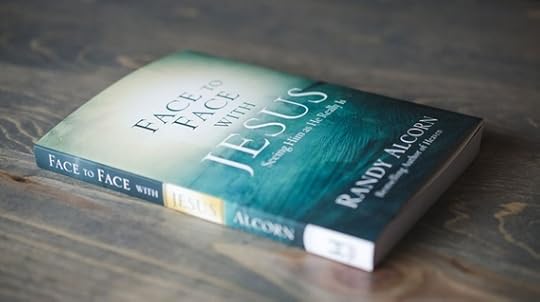Randy Alcorn's Blog, page 111
October 22, 2018
Sexual Sin Isn’t Only Wrong, It’s Just Plain Stupid

After hearing about several recent cases of sexual immorality involving Christian leaders, I’ve been rereading Proverbs. Solomon warns his son not to lust after an immoral woman, then asks two rhetorical questions:
Can a man scoop fire into his lap
without his clothes being burned?
Can a man walk on hot coals
without his feet being scorched?
(Proverbs 6:27-28)
The obvious answer is no. Regardless of how much we rationalize that we can get away with sin, its consequences are inescapable.
In case the point of his illustrations was missed, Solomon brings it home:
So is he who sleeps with another man’s wife;
no one who touches her will go unpunished.
(Proverbs 6:29)
The New Testament sounds the same warning as the Old, directed right at believers: “God will judge the adulterer” (Hebrews 13:4). We’re told to “Flee from sexual immorality” (1 Corinthians 6:18).
Throughout Proverbs a special emphasis is placed on the consequences of sexual sin:
For the lips of an adulteress drip honey,
and her speech is smoother than oil;
but in the end she is bitter as gall,
sharp as a double-edged sword.
Her feet go down to death;
her steps lead straight to the grave.
(Proverbs 5:3-5)
The Internet image, packaged to sell, is Satan’s bait. She’s the equivalent of the same adulteress Solomon spoke of thousands of years ago:
I find more bitter than death
the woman who is a snare,
whose heart is a trap
and whose hands are chains.
The man who pleases God will escape her,
but the sinner she will ensnare.
(Ecclesiastes 7:26)
Jesus said, “Whatever you have said in the dark will be heard in broad daylight, and whatever you have whispered in private in a closed room will be shouted from the housetops” (Luke 12:3).
There is no such thing as a private moment.
Moses warned, “You may be sure that your sin will find you out” (Numbers 32:23). Sometimes this judgment of God will come only after we’ve left this world. But normally the consequences start here and now, even before they’re publicly known.
A friend and I had to confront a man we dearly loved who was living a lie. Our message to him was, “What you’re doing is wrong. But it’s not only wrong—it’s just plain stupid!” In God’s moral universe, governed by the law of the harvest, whatever is right is smart and whatever is wrong is stupid. Notice what Scripture says:
But a man who commits adultery lacks judgment;
whoever does so destroys himself.
Blows and disgrace are his lot,
and his shame will never be wiped away.
(Proverbs 6:32-33, emphasis added)
Proverbs is a book written by a wise father for his son. It reminds us that we need to not only tell our children and ourselves and our friends to obey God because it’s right, but also because it’s SMART. Sin is never in our bests interests.
Sometimes, even though we should be, we aren’t sufficiently motivated by what’s right and wrong. In those times Scripture teaches us to be motivated by understanding what’s smart and what’s stupid.
The choice is ours.
I call heaven and earth as witnesses against you today that I have set before you life and death, blessing and curse. Choose life so that you and your descendants may live (Deuteronomy 30:19).
Photo by Joshua Newton on Unsplash
October 19, 2018
Scripture Gives Us Many Reasons to Be Happy

When someone says, as many have, “Happiness isn’t in the Bible,” it’s not even slightly true. Even in versions that don’t frequently use the words happy and happiness, the concept is conspicuously present, not only in its many synonyms (see here and here), but in words such as contentment, peace, delight, and dozens of others in every translation.
Consider this verse: “Who is a God like you, pardoning iniquity and passing over transgression for the remnant of his inheritance? He does not retain his anger forever, because he delights in steadfast love” (Micah 7:18). Such a passage may not seem to be about happiness, yet if we understand its meaning, won’t we be flooded with happiness?
“Oh sing to the Lord a new song, for he has done marvelous things! His right hand and his holy arm have worked salvation for him. The Lord has made known his salvation” (Psalm 98:1-2). There are no joy-related words in this verse, yet doesn’t it make you joyful?
Consider the lame man who leaped and praised God (see Acts 3:1-10).His story won’t appear in a study of words related to happiness, but he was obviously overwhelmed with happiness.
“We have an advocate with the Father, Jesus Christ the righteous” (1 John 2:1). No word for happiness is mentioned here, but how does it make you feel to know that Jesus is your advocate, your defense attorney? Can you imagine Jesus standing between you and your accuser, Satan (see Revelation 12:10)? The thought makes me smile, rejoice, and praise God.
Every passage that mentions our redemption; our new nature in Christ; and God’s love, grace, and mercy also makes a profound statement about our grounds for happiness.
What about eternal life? Puritan David Clarkson wrote, “Eternal life and happiness are reciprocal, and used as convertible terms in Scripture.” [1]
Revelation 7:16-17 offers a description of the eternal Heaven on the New Earth. It doesn’t mention any of the synonyms for joy and happiness. Yet happiness is exactly what it communicates:
They shall hunger no more, neither thirst anymore; the sun shall not strike them, nor any scorching heat. For the Lamb in the midst of the throne will be their shepherd, and he will guide them to springs of living water, and God will wipe away every tear from their eyes.
When the Bible says that God is for us and that nothing shall separate us from Christ’s love (see Romans 8:31, 39), no words for happiness are used, but the reasons for it jump off the page.
Even in the darkest portions of Scripture, such as Job or Lamentations, we’re hard pressed to find any chapter that doesn’t offer reasons for happiness.
Love, peace, contentment, kindness, grace, mercy, comfort, singing, praise, worship, favor, prosperity, deliverance, rescue, salvation, thanksgiving, satisfaction, chosen, redemption, gospel, trust, goodness, beauty, wonder, awe, excellence, and hope: don’t all these words evoke happiness?
If we grasp how happiness-saturated Scripture is, it will radically affect our perspective as God’s children and greatly expand our outreach to the world. Whatever else the plan of God and the gospel of Jesus encompasses, without question it includes our happiness.
For more on happiness, see Randy’s books Happiness and God’s Promise of Happiness, the devotional 60 Days of Happiness, and his DVD series Happiness 101.
[1] David Clarkson, “Believers’ Communion with the Father and Son,” The Practical Works of David Clarkson, vol. 3.
Photo by Ben White via Christianpics.co
October 17, 2018
When the Bible Conflicts with Our Culture

Here’s another great post from one of my sons-in-law, Dan Franklin, who’s married to my daughter Karina. (Make sure you don’t miss this video and article I shared from him recently, about The Problem with “Speak Your Truth.”) While I admit I am biased about not only my daughters but about both my sons-in-law, in my opinion this is really great teaching. You can read the transcript below, or watch and listen to what Dan has to say. —Randy Alcorn
Bible vs. Culture
By Dan Franklin
What do we do when something taught in the Bible comes into direct conflict with a deeply-held cultural value? This is a question that Christians have always had to wrestle with, and it is certainly a challenging question for Christians today. For example, what do we do with the teaching of the Bible is that sex outside of marriage is wrong, and yet our culture embraces the value of sexual freedom and casual sex?
Or, what do we do when the teaching of the Bible is that only those who embrace Jesus are saved, and yet we live in a culture that celebrates a pluralistic view of religion and faith?
When we face this conflict, those of us who don’t simply want to abandon the Bible can choose between one of two options. Our first option is simply to decide that what the Bible says was good for its original hearers, and it is still good for us today. Our second option is to decide that what the Bible says was good for the original hearers, but that it is no longer good for us today.
In other words, the first option would lead us to say, “It was good for the Israelites and the first-century Christians to save sex for marriage, and it is still good for us to do this today.” The second option would say, “It was good for the Israelites and the first-century Christians to save sex for marriage, but it is no longer something that is necessary for Christians today.”
Those who argue that there are parts of the Bible that, while perhaps good and helpful when they were written, are no longer good and helpful today, normally use two basic arguments for their position. The rest of this post will explore these two arguments.
#1: There Are Already Parts of the Bible that Christians Now Ignore
Some will say, “What is the problem with saying that we should ignore the Bible’s teaching about homosexuality? After all, there are already many other parts of the Bible that we ignore?” Now, some might simply mean that we no longer follow many of the laws for the Israelites in the Old Testament. While it is true that we no longer observe these laws, it is not because we have become more enlightened and moved beyond them. It is because Jesus came to fulfill these laws, and so their usefulness has run its course.
Others, though, when they argue this will give the example of slavery. The reason goes, “The Bible endorsed dehumanization through slavery, and yet now we reject this. So now we will also reject the dehumanization of saying that there is anything wrong with homosexuality.” While this may seem like a strong point on the surface, it ignores some important qualifiers.
First of all, in the Bible slavery is not commanded, but assumed. It is certainly true that there is no outright condemnation of the institution of slavery, but slavery was not invented by the Bible. Much like polygamy, slavery simply shows up and is tolerated. And while neither is condemned, negative fallout surround both of these realities.
Second of all, not all slavery is exactly the same. One of the reasons why many of us are baffled that the Bible does not condemn slavery is that we tend to think of slavery through the lens of how it was practiced in the United States. In his book Every Good Endeavor, Tim Keller gives some helpful insight into this issue. He writes, “In the ancient world there were many ‘slaveries.’ There is good evidence that much of slavery was very harsh and brutal, but there is also lots of evidence that many slaves were not treated like African slaves would be, but lived normal lives and were paid the going wage, but were not allowed to quit or change employers, and were in slavery an average of ten years.”
He continues, “To our surprise, slaves could own slaves, and many slaves were doctors, professors, administrators, and civil servants. (See Andrew T. Lincoln’s discussion of ancient slavery in his Word commentary on Ephesians, 415-420.) In his survey, Lincoln says that no one in ancient times could conceive of an economic or labor structure without it. While there were brutal forms of slavery, the concept—indentured labor in which the laborer was not free to market his skills to other employers—was considered a given. Quoting another scholar, he writes that this was not accepted, ‘one cannot correctly speak of the slave “problem” in antiquity’ (Lincoln quoting Westerman, 415.) In other words, no one—not even slaves—thought the whole institution should be abolished.”
This picture of slavery is very different than the U.S. form, which involved kidnapping and race-based slavery. In fact, the kidnapping form of slavery is condemned in the Old Testament. While we may wish today that the biblical authors condemned slavery, much of our desire for this is born out of a much more recent definition of slavery.
On top of all of this, the abolition of slavery did not come about through people saying, “The Bible has taught us to do this, but let’s move on to a more enlightened view of the world.” Abolition came when Bible-believing Christians pointed toward the teachings of Scripture in order to advocate for the end of the institution. They claimed that an institution based on kidnapping, racism, and oppression could never be squared with the biblical teaching that all human beings are created in God’s image.
#2: The Bible Simply Reflects the Viewpoint of Its Time
Some will argue that we should ignore certain teachings in the Bible because these teachings are simply reflections of what people believed during the time when it was written. For example, they claim, the reason why homosexual activity is not allowed and why male headship is taught is because people in those times simply thought homosexuality was distasteful and they believed that men were superior to women.
In some ways, this argument can seem appealing. After all, we are all influenced by the values of the times in which we live. A quick note, though. If we are rejecting the time-bound values of the Bible because we now have new values, how do we know that ours aren’t time-bound? In fact, how do we know that our culture’s values are not even worse? These are questions worth pondering.
But to claim that the Bible simply reflects the viewpoints of its time is to misunderstand the Bible entirely. Far from simply being a product of its time, the teachings of the Bible consistently confront readers with counter-cultural messages. Even the creation narrative itself stands in contrasts to other ancient creation myths.
While other nations believed that the world was created through a battle between many different gods, the Bible teaches that the world is a good creation from the one and only God. On top of this, Israel was not told simply to blend in with the other surrounding nations. Quite the opposite! They were given commands that led them to stand out as a peculiar people.
Jesus himself is subversive to his culture throughout his life, but especially in the Sermon on the Mount. He rebukes the practices of his time. And he does this not by casting the Bible aside, but by pointing people to not only the letter of the law but the spirit of it.
The central teaching of the Bible is the gospel of Jesus. In 1 Corinthians 1:22-25 Paul says this about the gospel: “Jews demand signs and Greeks look for wisdom, but we preach Christ crucified: a stumbling block of Jews and foolishness to Gentiles, but to those whom God has called, both Jews and Greeks, Christ the power of God and the wisdom of God. For the foolishness of God is wiser than human wisdom, and the weakness of God is stronger than human strength.”
The truth is that the Bible has always confronted culture. The Bible is not anti-culture. But God’s teachings through Scripture are meant to confront every one of us and to call us to a new way of thinking, experiencing, and living. The goal was never to make us comfortable with its teachings. The goal was to set our assumptions up against what God says and then to let us decide if we will embrace our cultural values or God’s revealed values.
2 Timothy 3:16 says, “All Scripture is God-breathed and is useful for teaching, rebuking, correcting and training in righteousness.” The question before all of us is this: Will we allow the Bible to rebuke us? Will we allow God, through Scripture, to correct us?
When we elevate our cultural values above the straightforward teachings of Scripture it is a way of us saying to God, “I will adopt what you say only whenever you agree with what I already think.” However, when we allow Scripture to rebuke us, we say to God, “I trust that you are wiser than I am, and I will willing to embrace a message that seems foolish to many because I believe that your wisdom will be vindicated in the end.”
Photo by James Coleman on Unsplash
October 15, 2018
When It Comes to Our Suffering, God “Gets It”

In all human history, who has paid the highest price for evil and suffering? Poll a hundred people on this question and only a few would come up with the right answer: God.
“This is love: not that we loved God, but that he loved us and sent his Son as an atoning sacrifice for our sins” (1 John 4:10). Many complaints against the Creator boil down to this: “God, you don’t ‘get it.’” Christ’s suffering says back to us, “No, actually, I do get it. It’s you who don’t get it.”
God paid the highest price on our behalf; we have no grounds for believing He doesn’t “get it.” Jesus suffered the same trials and temptations we do. God understands our worst losses and heartbreaks, even our temptations: “Because he himself suffered when he was tempted, he is able to help those who are being tempted” (Hebrews 2:18).
He knows suffering and temptation from firsthand experience. God calls us to hold firmly to our faith precisely because “we do not have a high priest who is unable to sympathize with our weaknesses, but we have one who has been tempted [tested] in every way, just as we are” (Hebrews 4:15).
God might say to us, “I have intimate understanding of what it is to be in your place. You have no clue what it is to be in my place. If you’d experienced Gethsemane and the march to Golgotha and the horrors of the Cross, you’d not question for a moment either my understanding or my love.”
And he might add, “After you’ve created a world, and seen your creatures betray you, and you’ve chosen to die for all their sins and offer them forgiveness... then come back and let’s talk about it.”
I share some more thoughts in this video:
For more related to the subject of suffering, see Randy’s book If God Is Good, as well as the devotional 90 Days of God’s Goodness and book The Goodness of God.
Photo by Tamara Menzi on Unsplash
October 12, 2018
John Piper on Identifying and Fighting Besetting Sins

Having turned 64 this year, this post from John Piper got my attention. It concerns what he learned about himself on a leave of absence at age 64. I prayed for him then, and now as I read this I also pray for myself.
Since I consider John, and many others, my betters in countless areas, I look at his list of self-diagnosed sins (though with the help of others) and pray that God would point out my sins as well, and that I would say yes to the Holy Spirit in doing my part to address them. What John speaks of isn’t unique to pastors or Christian leaders, but it is certainly common among us. And sometimes the worst sins are the ones we’re least aware of. Please pray for me and 1) all leaders and 2) all non-leaders. This applies to all of us men for sure, and I assume to many women as well. —Randy Alcorn
What I Learned About My Sins at Sixty-Four: How to Make War on Old Enemies
By John Piper
When I was sixty-four years old, I took an eight-month leave of absence from my pastoral ministry. The primary reason that I gave to the leaders and to the congregation was that I wanted to step back and do a soul check.
I wondered if the pressures of ministry might be blinding me to the state of my own soul as it related to worship and family and marriage and personal holiness. There was no great marriage crisis. I was not walking in any ministry-disqualifying sin, as far as I knew myself. But the stresses of family and marriage and ministry were enough to make me think that I should temporarily remove the pressure (and rewards) of preaching, and leading the staff, and all writing and social media.
During those eight months, part of my goal was to have the time and emotional energy and relational engagement with my wife so as to be as penetrating and as specific as I could be in identifying and addressing my most besetting sins, especially as they related to our relationship. What follows is a very abbreviated summary of what happened.
Putting Crosshairs on Besetting Sins
As I tried to be very specific in identifying my characteristic sins, it became evident what they were — namely, an ugly cluster of selfishness, anger, self-pity, quickness to blame, and sullenness.
Under the Bible’s Spirit-given searchlight — especially Paul’s — I was led not only to identify these five sins, but also to be ruthlessly specific in describing them. Here’s a description of my understanding and experience of selfishness.
Selfishness is virtually the same as pride and is at the heart of what Paul calls indwelling sin (Romans 7:23) — sin that remains in me as a believer. It is the corruption of my heart that is at the bottom of all my sinning. I see my selfishness function as a reflex in these five ways:
I expect to be served (Philippians 2:2–3).
I feel that I am owed (Ephesians 4:32).
I want praise (Romans 2:29).
I expect that things will go my way (1 Corinthians 4:12–13).
I feel that I have the right to react negatively to being crossed (Romans 12:19–21).
The reason I use the word reflex to describe these traits of selfishness is that there is zero premeditation before they happen. When these responses happen, they are coming from my fallen nature, not from reflection and resolution. I don’t sin out of duty. I sin spontaneously. They are the reflexes of my original, unmortified sinfulness.
Children of Selfishness
Now, what happens inside of me when this selfishness is crossed? Can I name these effects and describe them specifically and explicitly? Vague generalizations are usually evasions. Paul was teaching me that I must be specific. Here are the four effects of my selfishness being crossed:
Anger: the strong emotional opposition to the obstacle in my way. I tighten up and want to strike out verbally or physically.
Self-pity: a desire that others feel my woundedness, and admire me for my being mistreated, and move to show me some sympathy.
Quickness to blame: a reflex to attribute to others the cause of my frustrating situation. Others can feel it in a tone of voice, a look on the face, a sideways query, or an outright accusation.
Sullenness: the sinking discouragement, moodiness, hopelessness, unresponsiveness, withdrawn deadness of emotion.
And of course, the effect on marriage is that my wife feels blamed and disapproved of, rather than cherished and cared for. Tender emotions shrivel. Hope is depleted. Strength to carry on in the hardships of ministry wanes. And worst of all, these sins, as Paul makes clear, are “not in step with the truth of the gospel” (Galatians 2:14) — not “worthy of the gospel” (Philippians 1:27).
Canceled, Then Killed
During these months of self-assessment, Paul made crystal clear for me the connection between Christ’s cancelation of my sins on the cross and my conscious, willed conquering of my sins through blood-bought, Spirit-empowered effort. In other words, he blasted the pattern of passivity that I had developed in relation to these sins. He forced into my face the biblical reality that canceled sins must be killed, not coddled.
He showed me, for example, an important inconsistency I was living in. On the one hand, I believed in, and acted on, the necessity of my conscious effort in killing sexual lust. But I was more passive when it came to these ugly effects of selfishness. I had the unspoken assumption that lust must be attacked directly and consciously, since Jesus said to tear out your eye if you have to (Matthew 5:29). But for some reason, I assumed that I could not attack these besetting sins in the same way. They had to somehow dry up and disappear by an inner, unconscious work of the Spirit, without my effort.
It became increasingly clear during these eight months that the link between the cancelation of my sin on the cross and the conquering of my sin was sanctified effort. To be sure, the only effort that avails is blood-bought, Spirit-wrought effort. But it is, nevertheless, a conscious effort of my will. Passivity in the pursuit of holiness is not what Paul teaches. Paul piles up illustrations of how this works. I look back now and wonder: How had I become so passive?
Three of Paul’s Pictures
Here are three of Paul’s pictures of how the death of Christ cancels my sin and leads to effort.
1. In the death of Christ, we died to sin. Therefore, actively put sin to death.
We have been united with him in a death like his. (Romans 6:5)
Therefore:
You also must consider yourselves dead to sin. (Romans 6:11)
Let not sin therefore reign in your mortal body. (Romans 6:12)
2. In the death of Christ, we were bought. Therefore, actively glorify your new owner.
You are not your own, for you were bought with a price. (1 Corinthians 6:19–20)
Therefore:
Glorify God in your body. (1 Corinthians 6:20)
3. In the death of Christ, we were forgiven. Therefore, forgive.
God in Christ forgave you. (Ephesians 4:32)
Therefore:
Be kind to one another, tenderhearted, forgiving one another. (Ephesians 4:32)
My Empowered Will
In every case, the decisive impulse for my active effort in pursuing holiness — my active sin-killing — is the death of Christ. This means that the decisive power for conquering my besetting sins is the reality that Christ already canceled them. The only sins that I can defeat are forgiven sins.
But here’s what I had been missing: in each of these three cases, the link between the cross and my conquered sin is my empowered will. I say that because, in each of these three cases, Paul makes the statement of my death, my purchase, and my forgiveness the cause of a command addressed to my will. “Let not sin . . . reign in your mortal body.” “Glorify God in your body.” “Be kind to one another, tenderhearted, forgiving one another.” Those commands are addressed to me. They engage my will.
In other words, God intends that part of my experience of sanctification be conscious, willed opposition to specific sins in my life. I had applied that to lust. But for some reason, I had failed to apply the same brutal intentionality of sin-killing to my selfishness, anger, self-pity, quickness to blame, and sullenness.
War on a Winter Night
The overall effect of these discoveries was a new and focused attack on specific sins, with a kind of intentionality I had never exercised before, except in fighting sexual lust. When I came back to the church from this eight-month leave, I spoke about all this in a chapel message at Bethlehem College & Seminary and used the following illustration to help them understand what I was learning.
On a recent Sunday evening, it was cozy and snowy, and my wife and daughter and I were home alone. I was looking forward to something we would all do together. But my fourteen-year-old daughter came in from the dining room and said, “Mommy and I are going to watch Supernanny on the computer.” They set it up and started watching — without me.
Now, as insignificant as this incident seems, in that moment the temptation for selfishness, anger, self-pity, blaming, and sullenness was as dangerous to my soul as any sexual temptation. So, with new intentionality and ruthlessness, I immediately said to those rising sinful feelings, No! — not out loud, but to my sinful soul. Then I quietly went upstairs, consciously renouncing any body language of woundedness (though I was feeling it).
In my study, I waged war. Effort! I turned my mind and heart toward the promises of God, and the surety of the cross, and the love of the Father, and the wealth of my inheritance in Christ, and the blessings of that Lord’s Day, and the patience of Jesus. And I held them there in my mind where I could see them.
I cried to the Lord for blood-bought help, and I consciously, intentionally (not passively!) beat down the anger and self-pity and blaming and sullenness, as utterly out of character with who I am in Jesus Christ (1 Corinthians 5:7). And I kept beating until they were effectively dead.
Better Days Ahead
I freely admit that it would be far better — a sign of greater maturity and sanctification — if there did not have to be any war at all, if I had never felt these sinful feelings rising in my heart. That will come.
But until then, I thank God that he cancels sin at the cross, that he breaks the power of canceled sin, and that he does it sometimes through my Spirit-empowered will that fights with all its might.
By John Piper. © Desiring God Foundation. Source: desiringGod.org
October 10, 2018
The War on Unborn Black Children in the U.S.

Recently prolife advocate Abby Johnson shared the picture below on her Facebook page, along with this caption: “The abortion war against black women is so real. This is on a billboard in Dallas.”

Several years ago, John Piper preached on the question of “When Is Abortion Racism?” He said:
In the Dred Scott v. Sandford decision of 1857, the Supreme Court held that Black slaves were property without rights as free persons. But today, we rightly view that as unthinkable. My hope is that even though the Supreme Court in the Roe v. Wade case of 1973 did not give the unborn the rights of free persons, nevertheless, the day may come when that too is viewed as unthinkable. Racism might—and often did—result in the killing of innocent humans in our history, it often did. But abortion always results in the killing of innocent humans. Between 1882 and 1968, 3,446 Black people were lynched in America. Today more Black babies are killed by white abortionists every three days than all who were lynched in those years (Life Education and Resource Network).
As I’ve shared in the past on my blog, Planned Parenthood’s abortion advocacy was rooted in the eugenics movement and its bias against the mentally and physically handicapped and minorities, all of which are historical facts. This history helps to explain why to this day Planned Parenthood does virtually nothing to promote adoption or help poor and minority women who choose to give their children life rather than abort them. The fact that there are some highly visible African Americans and other minority leaders in Planned Parenthood does not change its heritage or philosophy. It simply makes it easier to carry out its policies among target groups. The same is true of other abortion promoting organizations and clinics.
To clarify, I do not believe that most people who support abortion rights are racists, any more than I believe there are no racists among pro-lifers. I am simply suggesting that a closer look at both the history and present strategies of the pro-choice movement, regardless of motives, suggests that “abortion for the minorities” may not serve the cause of equality as much as the cause of supremacy for the healthy, wealthy, and white.
BlackGenocide.org shares these statistics about the effects of abortion on the Black community:
On average, 1,876 black babies are aborted every day in the United States.
This incidence of abortion has resulted in a tremendous loss of life. It has been estimated that since 1973 Black women have had about 16 million abortions. Michael Novak had calculated “Since the number of current living Blacks (in the U.S.) is 36 million, the missing 16 million represents an enormous loss, for without abortion, America’s Black community would now number 52 million persons. It would be 36 percent larger than it is. Abortion has swept through the Black community like a scythe, cutting down every fourth member.”
Jemar Tisby, president of the Reformed African American Network, writes this in his article Christian, pro-life and black: Advocating for all of life:
God loves the little children, but black babies are dying by the score. According to the Center for Disease Control and Prevention, an African American woman is almost five times more likely to have an abortion than a white woman. In the state of Mississippi, white women had 665 abortions in 2006, or 22.6 percent of all abortions in that state. By comparison, black women had 2,250 abortions or 76.3 percent of the total.
Finally, let me recommend Greg Morse’s excellent article “The Monumental Problem: Hashtag Acticism and Covert Racism.” Here’s a portion of it:
I used to roll my eyes when someone would post articles about abortion. As a black man, it seemed like a distant problem from me and the community. Then it wasn’t.
I remember feeling asphyxiated as I read and studied. The institution has millions and millions of racial skeletons in its closet. When Satan’s spell is finally broken, the abortion clinic will be held in the same infamy as lynching ropes, metal shackles, and slave ships. If not in this life, then most certainly in the next.
The blindness staggers. Cries of racism can be heard at every turn and yet a great silence ensues concerning a multimillion dollar company (Planned Parenthood) capitalizing off of dead black babies? Hmm . . .
It has roots in a racist eugenics program called The Negro Project, check. Sanger desired to limit the population of the “feeble minded” and spoke at a KKK rally, check. Most abortion clinics are in disenfranchised, minority communities, check.
And new minority skeletons are added every day.
Around 950 black children—each with ten fingers and ten toes—are devoured every single day. Forty every hour. Villainous men in hoods—or now without hoods—cannot accomplish the level of carnage that men in white coats inflict daily. No days off. No relenting in this evil institution. This historic relic, this monument to racial supremacy and eugenics, needs to fall.
And we must call for it to fall. We detest racial supremacy in all forms—especially against the most vulnerable minority population on the planet. Our Facebook statuses cannot be filled with tons of outrage over a group of whites hating blacks in Charlottesville, while never saying anything about the abortion clinic down the street that dismembers minority children.
As Ismael Hernandez rightfully said, “Past racists snatched black babies from their mother’s arms and sold them into slavery. Today they snatch them from their mother’s womb and throw them in the garbage.”
May God continue to raise up African American spokespeople to intervene for unborn black children. And may all of us speak up for the unborn and their mothers of every race and nationality.
Meanwhile, may pro-lifers everywhere also speak up for racial justice. If we stand for the right of minority children to live, that same sense of God-inspired justice should compel us to stand up for their rights as long as they live.
In that regard, here are some blogs I’ve written on racial justice:
Brotherhood and the Color of Our Skin
Charlottesville: Reminding Everyone that Racism is Alive and Ugly
Dream with Me: One of My Heroes, John Perkins
Benjamin Watson speaks at the 2017 March for Life
October 8, 2018
Authentic Love Is a By-Product of Brokenness

We first got to know our dear friend Tami Yeager when she was a part of our EPM staff. She is a dear sister with a big heart for the Lord and for people, especially believers who are suffering and being persecuted. That heart for others leads her to periodically leave her job at a nearby school here in Oregon to serve refugees in the Middle East.
I found what Tami wrote on her blog touching. And I just love the picture of her with the kids! It’s a wonderful representation of who she is and reflects how she lives out what she writes. May her words encourage all of us, especially those of us who are experiencing suffering, to “love one another deeply, from the heart” (1 Peter 1:22, NIV). —Randy Alcorn
Loving from the Center of Who You Are
By Tami Yeager
“Love from the center of who you are; don’t fake it. Run for dear life from evil; hold on for dear life to good. Be good friends who love deeply; practice playing second fiddle” (Romans 12:9-10, The Message).
The simplicity of loving from the center of who I am is what calls me to the other side of the world, again and again. It’s what compels me to go—and risk and serve and love. Loving from the center of who you are will require courage and bravery. It’ll challenge you to love bigger then fear and dream larger then life.
“God never measures the mind… He always put His tape measure in the HEART.” – Corrie Ten Boom
Some of the sweetest of relationships and communities I’ve tasted are in places steeped in suffering. Community is rich there—we share a common bond—pain and brokenness. In this place being transparent and genuine takes on a whole new meaning. It’s as if the fires of life on this side of eternity have helped to bridge the barriers of culture and difference and misunderstanding. Real and raw and extravagant love weaves our lives together.
I’m convinced that authentic love is a by-product of brokenness.
We were created for community and shared lives and love. The sharing of ourselves with others won’t happen without our showing up and being seen.
This prodigal daughter is well acquainted with my Father’s love. I know His embrace. I’ve experienced extravagant love. He’s never intimidated by my brokenness, failures, or sin. Resting in His arms is familiar territory for me.
“The son said to him, ‘Father, I have sinned against heaven and against you. I am no longer worthy to be called your son.’ But the father said to his servants, ‘Quick! Bring the best robe and put it on him. Put a ring on his finger and sandals on his feet. Bring the fattened calf and kill it. Let’s have a feast and celebrate. For this son of mine was dead and is alive again; he was lost and is found.’ So they began to celebrate” (Luke 15:21-24).
God’s love saves me time and time again. He’s graciously taken my broken, tattered, and bruised heart and given me a new one, enlarging my capacity to love God and people.
Recently, I was allowed the honor of sitting with a young Middle Eastern girl named Layla. She was pure joy to be with.
Layla’s sister was kidnapped last year. Sadly, kidnapping of young girls in this area is not uncommon. Christian girls are prime targets. Her sister, Amira, was 14 years old at the time. Her captors planned to force her to convert and marry her kidnapper, a man her father’s age. Layla and Amira are the daughters of a Christian pastor from a poor village. The family lacked the money being demanded by their daughter’s kidnappers.
The Middle East is rich in family bonds and loyalty in communities. Amira’s ransom was raised by her extended family and she was rescued. She was swiftly moved far from home and into a safe house for young girls.
Layla and Amira’s father succumbed to a broken heart and died shortly after the ransom was paid and Amira was safe. The weight of pain that rested upon him proved too heavy a burden to shoulder. The Middle East is a shame and honor society, and even victims bear the shame from atrocities committed against them.
Amira continues to live in a safe house for her protection and that of her family. She is able to have regular visits with her mother, Layla, and other relatives. As for Layla and her mother, they’ve relocated to the home of her uncle.
One would think that Layla would be withered from the trauma she’s met head on in her young life. To the contrary. She shines with a special grace afforded those who’ve traversed through the precipice of suffering and loss. Amidst her heartache, God has graced her with joy and happiness. The fires of suffering having produced in her the purest of gold.
I’ll not soon forget Layla—or her story. Her brown eyes and beautiful smile are forever seared upon my heart. I would have traveled half way around the world to sit with her. We laughed, talked, and cried together. She held my arm tight and laid her head upon my shoulder while saying to me, “I love you,” or in Arabic, “أحب.”
I’m thankful that we we’re not made to travel this side of eternity alone—but with hearts wide open.
“Suffering is nothing by itself. But suffering shared with the passion of Christ is a wonderful gift, the most beautiful gift, a token of love.” —Mother Teresa
October 5, 2018
My Newest Book: Face to Face with Jesus

Do you remember the day, the moment, you met the Son of God for the first time? No matter how long we’ve walked with Christ, there’s always more to discover and learn about Him. To truly know Jesus and follow His example, it’s essential that we continually study and contemplate His words and the incredible aspects of His character.
That’s why I’m excited about my new book, Face to Face with Jesus: Seeing Him as He Really Is! It includes 200 mini-chapters (one page each) all about Jesus, King of Kings, my Savior and my best friend. Each entry includes Scripture, a devotional thought, and an inspirational quote.
I recently received my advanced copy and have read about 50 of them. I don’t often read my own books, as by the time they come out I’m tired from all the work! But I’ve found God is speaking to me through the Scripture and quotations, and I hope He speaks to you, too.
I believe there’s something unique about Face to Face with Jesus and that it can encourage people who like reading short entries with biblical substance. Please pray with me that God would use the book to touch the lives of all those who read it.
Among other things, it’s an unusually beautiful book and would make a great Christmas present—especially because it’s about the Jesus whose birth we celebrate!
Here are three sample entries:
When the set time had fully come, God sent his Son, born of a woman, born under the law, to redeem those under the law, that we might receive adoption to sonship. (Galatians 4:4-5)
God always knew the exact moment he would send Jesus Christ to the earth. When the gospel was manifested in Christ, God made sure the world had experienced enough of life without the Messiah to see their desperate need for the “good news of happiness” (Isaiah 52:7 NLV).
Jesus was the Lamb, the Passover, Priest, Prophet, King, the Bread of Life, the Word. Without history and the Scriptures, we would never have understood the depths of the Godhead.
God designed the world in such a way that he knew to send Messiah at just the right time.
“God hath long contended with a stubborn world, and thrown down many a blessing upon them; and when all his other gifts could not prevail, he at last made a gift of himself.” —Henry Scougal
He who did not spare his own Son, but gave him up for us all—how will he not also, along with him, graciously give us all things? (Romans 8:32)
The God who gave us his Son delights to graciously give us “all things.” These “all things” are in addition to Christ, but never instead of him—they come, Scripture tells us, “along with him.” If we didn’t have Christ, we’d have nothing. But because we have Christ, we have everything.
Asaph says, “Whom have I in heaven but you? And earth has nothing I desire besides you” (Psalm 73:25). This may seem an overstatement—there’s nothing on Earth this man desires but God? But Asaph is affirming the central desire of our hearts is for God.
And when we realize what it means to have Jesus, we’ll never be disappointed.
“There is only one Being who can satisfy the last aching abyss of the human heart and that is the Lord Jesus Christ.” —Oswald Chambers
He will swallow up death forever; and the Lord God will wipe away tears from all faces. (Isaiah 25:8 ESV)
David asked God, “List my tears on your scroll—are they not in your record?” (Psalm 56:8). David believed his suffering mattered, that God counted it as precious, so precious that the Lord kept track of every tear.
This gives special meaning to the promise that God will wipe away every tear from his children’s eyes. We’re again promised in Revelation 7:17: “God will wipe away every tear from their eyes.” This means God’s hands will touch the face of each child, removing every tear.
Remember, God not only made tear ducts but has them. Jesus as the God-man shed tears (John 11:35). When Jesus wipes away tears with his gentle, omnipotent hand, I believe our eyes will fall on the scars that made our suffering his so that his eternal joy could become ours.
“A Jesus who never wept could never wipe away my tears.” —Charles Spurgeon
October 3, 2018
We’re Not Just God’s Servants, But Also His Children, Heirs, and Friends

I love to read Scripture, but I also love to listen to it on audio. There are free apps that offer you audio, including YouVersion, but I’ve used Audible.com to purchase and download the Bible read by actor and Christ-follower David Suchet, whose voice and inflections I love. Whatever audio version you use, there’s nothing like HEARING God’s Word. When you’re driving or doing something mindless, why not listen to God?
I was listening to David Suchet reading Galatians, and I kept hitting the reverse button on my Audible app to go back and listen to this verse again and again: “So you are no longer a slave, but God’s child; and since you are his child, God has made you also an heir” (Galatians 4:7).
The words “no longer a slave” reminded me of what Jesus said: “I no longer call you servants, because a servant does not know his master’s business. Instead, I have called you friends, for everything that I learned from my Father I have made known to you” (John 15:15).
So, if we are “no longer” God’s slaves or servants, why does the Bible continue to refer to us as those in other places? For example:
“So you also, when you have done all that you were commanded, say, ‘We are unworthy servants; we have only done what was our duty’” (Luke 17:10).
“But now that you have been set free from sin and have become slaves of God, the fruit you get leads to sanctification and its end, eternal life” (Romans 6:22).
“For the one who was a slave when called to faith in the Lord is the Lord's freed person; similarly, the one who was free when called is Christ's slave” (1 Corinthians 7:22).
“Live as people who are free, not using your freedom as a cover-up for evil, but living as servants of God” (1 Peter 2:16).
I think the answer is we are no longer only slaves or only servants. God looks at us genuinely as both His children and His friends. Incredible! I think this means we should never deny or minimize the fact that we are God’s servants, and should realize that itself is a high calling. But we should simultaneously affirm the wondrous fact that we are His children and His friends—and also His heirs and delegated rulers of His creation. We are all of those simultaneously.
As Nanci and I face the battle with her cancer, we know we are indeed God’s servants, but how encouraging to know we are not just that. We are also His beloved children and His trusted friends, and heirs that will one day help rule the New Earth to His glory! As such we can trust Him fully, and know that what He has for us really is for our good, as Romans 8:28 promises. We are heirs of the family business, which is ruling the universe, a task He is, often through our hardships, preparing us for.
God can and does love His servants, but He certainly loves wholeheartedly His children and His friends. And He intends to do His best for us, even when that best takes a different form than we might have chosen.
Photo by skalekar1992 on Pixabay
October 1, 2018
Ray Ortlund on Certainty, Openness, and Theological Wisdom

I loved this post below from author and pastor Ray Ortlund, and asked his permission to share it on my blog. It’s a great reminder that we need to examine ourselves and correct ourselves. We who are truth-oriented, or in Ray’s words, “all certainty,” when it comes to every area of theology, need to go out of our way to affirm grace and choose humility. We who are grace-oriented, or as Ray says, “all openness,” need to go out of our way to affirm God’s revealed truth and anchor ourselves to it.
Thanks, Ray, for this helpful post. —Randy Alcorn
Certainty, openness, and theological wisdom
By Ray Ortlund
Some Christians seem “all certainty.” Maybe it makes them feel heroic. But they see too few gray areas. Everything is a federal case. They have a fundamentalist mindset.
Other Christians seem “all openness.” Maybe it makes them feel humble. But they see too few black-and-white areas. They have a liberal mindset—though they may demonstrate a surprising certainty against certainty.
The Bible is our authority as we sort out what deserves certainty and what deserves openness. For example, 1 Corinthians 15:1-4 defines the gospel of Christ crucified for our sins, Christ buried and Christ risen again on the third day, according to the Scriptures, as “of first importance.” Here is the center of our certainty.
From that “of first importance” theological address, we move out toward the whole range of theological and practical and worldview questions deserving our attention. The more clearly our logic connects back with that center, the more certain and the less open we should be. The further our thinking extrapolates from that center, the less certain and the more open we should be. When a question cannot be addressed by a clear appeal to the Bible, our conclusions should be all the more modest.
The gospel requires us to have high expectations of one another on central doctrines, unmistakable views and obvious strategies, and it cautions us to be more relaxed with one another the further we have to move out from the center.
Building our theology and worldview is not like pushing the first domino over, which pushes the next over, and so forth, down the line—each domino of equal weight and each fall equally inevitable. Rather, building our theology and worldview is more like exploring a river. We start out at the mouth of the river. It is wide. There is no decision to make. But then we start paddling up-river. As each tributary forks into the river, we must decide which way to go. Indeed, it may eventually become difficult to distinguish between the river itself and a tributary. But many decisions must be made along the way, not every one equally obvious.
This is why we need a map of the whole, noting the main features of the topography, such as 1 Corinthians 15:1-4 provides. There are other scriptures that help us globalize our biblical thinking in this way. For example, Exodus 34:6-7 is quoted multiple times throughout the rest of the Old Testament. Clearly, it is an atomically weighted passage that other biblical authors treated as a sort of theological North Star for guidance. There are other passages meant to help us improve our overall theological wisdom and a fair-minded sense of proportion and legitimate expectations of one another.
A church or movement may desire, for its own reasons, to define secondary and tertiary doctrines and convictions as important within their own ministry. That’s okay. But then it’s helpful to say, “We know this isn’t a dividing line for Christian oneness. It’s just a decision we’ve made for ourselves, because we think it will help us in our situation. We realize that other Christians will see it differently, and we respect their views.”
May we become more certain where we’ve been too open, and more open where we’ve been too certain, according to the totality of Scripture. And where it seems helpful to provide further definition on our own authority, may we do so with candor, gentleness, and humility.
This article first appeared on The Gospel Coalition , and is used by permission of the author.
For more on this topic, see Randy’s book The Grace and Truth Paradox, and his devotionals Grace and Truth.
Photo by Julien Lanoy on Unsplash



